To the 185 anniversary of the birth of M.I. Dragomirov 8 (20) .11. 1830 – 15 (28). Xnumx
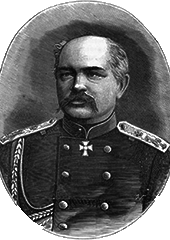 Mikhail Ivanovich Dragomirov - statesman and military leader, theorist, teacher, writer. He left behind him works that are rightfully considered to be classics of the national military school.
Mikhail Ivanovich Dragomirov - statesman and military leader, theorist, teacher, writer. He left behind him works that are rightfully considered to be classics of the national military school.For services to military science M.I. Dragomirov was elected an honorary member of Moscow and Kiev universities, vice-president of the Nikolaev Academy of the General Staff, an honorary member of the Mikhailovsky Artillery Academy, the Swedish-Norwegian Royal Military Academy in Stockholm (from 1896), the national society Medailles militaires in France (from 1900) ) and etc.
He was also elected an honorary citizen of the Bulgarian city of Sistovo to commemorate the crossing of the Danube 15 on June 1877.
“Dragomirov’s extensive reading in all fields of knowledge, his many-sided interest, the unstoppable, seething need to respond to all phenomena of life, the ability to penetrate into the depths of things, great common sense, deepened by wide everyday experience, strong critical mind, brilliant publicistic talent, caustic sarcasm of his speech , the ability of one apt, sharp word to characterize persons and events and to reveal their essence, free and courageous behavior, although sometimes harsh, reflecting his attitude towards people and their actions independently from their ranks and official position - all this made Dragomirov one of the largest and at the same time most original people of his time, popular in all sectors of society and not only in Russia, but also abroad. His system of education and training of troops, his views on military affairs and, in particular, in the field of tactics, had ardent admirers and ardent opponents. As a talented person, he managed to penetrate deeply into the nature of military affairs and into the essence of military life, ”as M.I. Dragomirova military figure MD. Bonch-Bruevich.
Mikhail Ivanovich Dragomirov was born 8 (20) in November 1830 of the year near the town of Konotop of the Chernigov province (now Sumy region), on a farm belonging to his father - Ivan Ivanovich Dragomirov. Mikhail Ivanovich's father came from hereditary nobles of the Chernigov province. In his youth, Ivan Ivanovich served in one of the dragoon regiments and participated in the Patriotic War 1812 of the year, and then retired and engaged in agriculture on his farm.
The initial general education Dragomirov received in Konotop city school, and the military - in the Noble regiment (later Konstantinovsky military school). He graduated from the full course in 1849 year as sergeant-major "one of the most excellent" with his name on the marble board, was released to the service of an ensign in the Life Guards Semenovsky Regiment. While performing his duties, Dragomirov is actively engaged in self-education in order to prepare for admission to the academy.
In 1854, with the rank of Lieutenant Dragomirov, he was accepted into the Imperial Military Academy, from which he graduated in 1856 in the first category with a gold medal and his name on the marble board. For "excellent progress in the sciences," he was promoted to the rank of captain. After graduating from the academy, Dragomirov was assigned to the department of the General Staff with assignment to the General Staff.
Dragomirov wrote his first work, “On Landings in Ancient and Recent Times,” in 1856. In its depth and completeness it is historical the study of landing operations was an example of a scientific approach to the problem under study. Dragomirov skillfully used his knowledge in this area during the Russian-Turkish war of 1877-1878.
In 1858, the year M.I. Dragomirov is sent from the academy for one year abroad to study military affairs and collect tactical information. The highest he was allowed to be at the headquarters of the Sardinian army. Returning from an overseas business trip in 1859, he presented a report to the Imperial Military Academy Conference entitled "Outlines of the Austro-Italian-French War 1859 of the Year." In this work, he demonstrated the ability to in-depth analysis of events and phenomena of war, and, in particular, drew serious attention to the "properties of the armies of the warring parties," highlighting and emphasizing the influence of the "moral side" in military affairs. The moral side in the Russian army at that time was understood as the spiritual qualities of a warrior, which included loyalty to the throne and fatherland, church, discipline and sense of duty, self-sacrifice.
Studying the reasons for the victories and defeats of the parties during the 1859 war of the year, Dragomirov established: the main reason for these victories and defeats lies in the moral qualities of the troops. He concludes that in order to achieve success in a war, one must first prepare the troops “properly”, that is, bring their combat training to the highest degree and form high moral qualities among the soldiers. Already at an early stage of his military activities, Dragomirov put the task of educating them in the first place in training troops, linking this process with training tasks.
At that time these firmly expressed views seemed hardly applicable to army reality and even harmful. Many believed that Dragomirov had attacked the foundations of the army, that he was preaching some kind of destructive idea.
To correctly understand the value of the contribution of MI. Dragomirov on the development of military affairs in Russia, it is necessary to briefly refer to the historical period in which his military activities began.
After the heyday of the military art of the Russian army in the era of A.V. Suvorov and the Napoleonic wars, it was time for his decline. The rigid system of military control created a whole pleiad of military commanders, unconditionally disciplined in the sense of unquestioning obedience to orders, but in many respects deprived of independence and initiative. Many commanders did not think about what should be the soldiers led by them, so that they could solve difficult tasks in a war and believed that a soldier trained according to the Prussian pattern and obedient to their will of the soldiers would be terrible for the enemy alone. In such an atmosphere, the Russian army met the Crimean War of 1853 – 1856. The valor of Russian soldiers and officers who selflessly went to combat exploits could not save the situation, and the Russian army paid with its blood for errors in the combat training of troops and their education.
Against this background, Dragomirov’s bold statements that “a soldier must not be trained, but educated,” “a soldier must reason”, “must practice the moral and physical side of the troops,” that the general “task of educating and educating a soldier is to specialize him without breaking a person in him ”were unusual for that time. Many were convinced that these views would lead to the complete breakdown of discipline in the army.
In 1860, Dragomirov was promoted to captain and appointed adjunct professor of tactics at the Nikolaev Academy of the General Staff, leaving him in the Guards General Staff. From January 1861 to June 1863, he taught tactics and military history to the heir to the throne, future Emperor Alexander III. The works of the young teacher were published in the Engineering Journal, the Armory Collection, and the Artillery Journal. Dragomirov is actively developing his views on the tactics of using troops in offensive and defense, field fortification, etc. For example, he argued that the requirement “not a step back”, applied without reasoning, more than once led not only to large military losses, but also to defeats where they could have been avoided.
In the magazine "Gunsmith collection ”for 1861 (No. 1, 2), Dragomirov’s articles were published under the title“ The Impact of the Distribution of Rifled Weapons on the Education and Tactics of Troops ”,“ Some Explanations for the Article on the Training of Troops ”, which concentrated on the essence of the new approach to preparing troops for peace time. According to the author, the appearance of rifled weapons led to the need "to demand from the soldier reasoning as a prerequisite for the success of the action with a new, more advanced weapon."
In the 1859 Italian Campaign Review of the Year, published in the Engineering Journal for the 1864 Year, considering the significance of the moral side in military affairs, Dragomirov concluded that "the basic unit in military affairs is man." This idea was subsequently formulated by him as follows: “in military affairs, rather by volitional than mental, in the first place is a man with his moral energy”. This provision was considered to be the basis of the entire Dragomirov military training exercise.
Dragomirov argued that with a low level of development of the moral side in the army, "no perfection of technology will not help." In other words, he demanded that, “striving for the development and improvement of military equipment, first of all pay attention to educating the moral side of an individual fighter and the military mass, with the expectation of putting it at a height at which they can perceive and apply in combat situations the more advanced technique to strive for in order to ensure success in war. ”
In the troop training system, Dragomirov insists on a preference for “showing” a story, requires “training with live ammunition and charges,” rebel against enthusiasm for watches and parades, against the prevalence of statutory requirements during tactical training of troops.
In 1864, Dragomirov was promoted to colonel with the appointment of 2 Guards Cavalry Division as Chief of Staff. Simultaneously with his duties in this position, Dragomirov continued his professorship at the academy. In his lectures, he focused on mastering the officer corps of the system of training and education of the great Russian commander A.V. Suvorov.
Talents of Mikhail Ivanovich as a military scientist unfolded during the reign of Alexander II. The elimination of serfdom in 1861 year became a powerful driver of change in military affairs, and in the person of Dragomirova, Minister of War D.A. Milyutin found an outstanding spokesman of new ideas that could be implemented during military reforms.
Merit M.I. Dragomirova in front of the Russian army is that he “laid the foundation for her emancipation, pointing out the new path she should take, in order not only to preserve but also to develop morale and military knowledge for her further progress along the steep ladder of military art” . The basis for the preparation of the Russian army in peacetime was the provisions of Dragomirov, firmly grounded not only theoretically, but also from practical combat experience.
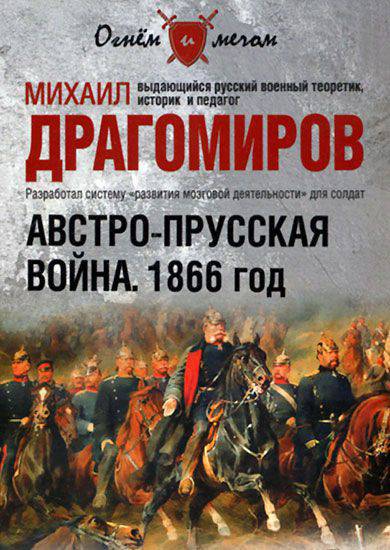
First published in 1872.
From 16 June to 18 August 1866, Dragomirov was assigned as a military agent to the Prussian army during the Austro-Prussian War. Returning to Russia, he compiled the Essays on the Austro-Prussian War in 1866. He based his conclusions on military history as well as on sociology and psychology, and this was the originality, depth and vitality of his work.
In 1866, Dragomirov was transferred to the service of the Nikolaev Academy of the General Staff, with the dismissal of the post of chief of staff of the 2 Guards Cavalry Division. He was a professor in the department of tactics until the 1869 year.
The 1866 war experience of the year allowed MI Dragomirov more deeply cover the issues of education and education of a soldier and an officer, as well as combat training of military units. He did not cease to study and promote the experience of Suvorov and his "Science of Victory". In the same period of his activity, Dragomirov thoughtfully approaches the issues of theory and practice of maintaining law and order in the army. Here, he puts in the first place the significance of the statute of internal service, which, establishing the rights and duties of a soldier and officer, "serves to maintain order in the troops and protects every soldier from unlawful encroachment."
In 1868, Dragomirov wrote a famous critique of the novel by L.N. Tolstoy "War and Peace" from a military point of view.
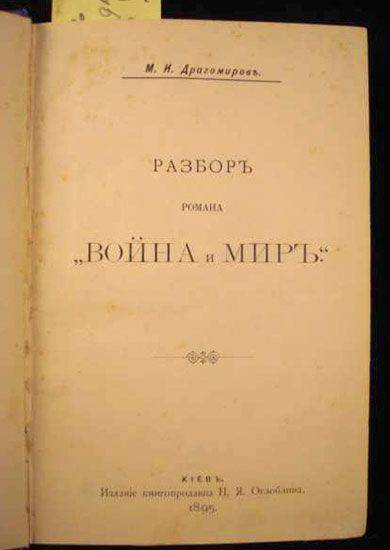
Kiev, ed. N. Ya. Ogloblina. 1895.
In 1868, Dragomirov was promoted to Major General, leaving the Academy as a professor; in 1869, he was appointed Chief of Staff of the Kiev Military District; in 1872, he was enrolled in the retinue of His Imperial Majesty.
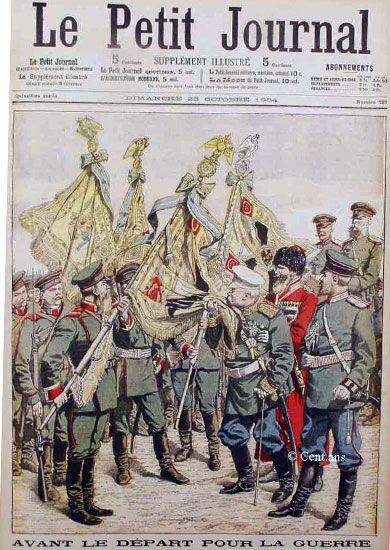
In 1873, he was appointed commander of the 14 Infantry Division and gave his training his knowledge, energy and all his experience.
The division training was based on the principles put forward by the new commanders: the troops "should be trained in peacetime only what they have to do in the war", "the proportionality of the requirements with the natural properties of man", respect for the law and strict execution by all officials, understanding of the essence of military discipline and its steady execution, the use of disciplinary sanctions in accordance with the "nature and essence of misconduct and omissions of subordinates."
The guiding ideas and positions, thoughts and teachings of Dragomirov were laid out in the “Memorable Book of the ranks of the 14 Infantry Division”. He demanded that the training of a soldier be carried out according to a specific program, so that each exercise would be thought out by officers first. Regarding tactical training of troops, Dragomirov established that “until tactics are shown to troops in the field according to methods and until every new reception is shown by the commander himself, no sensible actions in the war can be expected from the troops”.
Commanding the division, MI Dragomirov continued to study the experiences of the 1866, 1870 – 1871 wars. The results of his research, he published in articles under the general title "Army Notes".
14 April 1877 year M.I. Dragomirov, with his division as part of the troops of the 4 Corps, marched from Chisinau to participate in the war with Turkey. The 14 Division was tasked with first overcoming the Danube, and Dragomirov was entrusted with the main concerns of conducting a reconnaissance, preparing forwarders, and developing an action plan. He considered the division’s participation in the war as a test of his system for training troops in peacetime. The division successfully coped with the combat mission with minimal losses. Dragomirov was awarded the Order of St. George 3 degree.
In late April, Dragomirov with the division moved into the depths of Bulgaria towards Tarnovo. In August 1877, the division fights on the Shipka Pass, where on August 12 he was badly wounded by a bullet through his knee. For his distinction in the defense of the Shipkinsky Pass, Dragomirov was promoted to lieutenant general and sent to Chisinau for treatment. Famous surgeon N.I. Pirogov spoke in favor of amputation of the leg, but this was avoided by local doctors. The wound healed slowly, and the leg did not bend. Dragomirov was appointed to consist of the commander-in-chief of the active army, with the dismissal of the chief of the 14 Infantry Division and leaving the General Staff.
In the spring of 1878, Mikhail Ivanovich moved to Petersburg and was appointed head of the Nikolaev Academy of the General Staff, and then adjutant general, leaving the post of head of the academy. Eleven years M.I. Dragomirov with a firm hand led the training of officers of the General Staff, developing many theoretical questions of military art. By this time he was already a famous military figure not only in Russia, but also abroad. His works were read and carefully studied.
In 1879, Dragomirov published a Tutorial Tutorial, which presented a coherent pedagogical system that answers the two main questions of troop training: “what to teach?” And “how to teach?”. This work for over twenty years served as the main tool for training officers in the art of tactics. In 1881, the second edition of the Tactics Textbook followed, somewhat enlarged and modified.
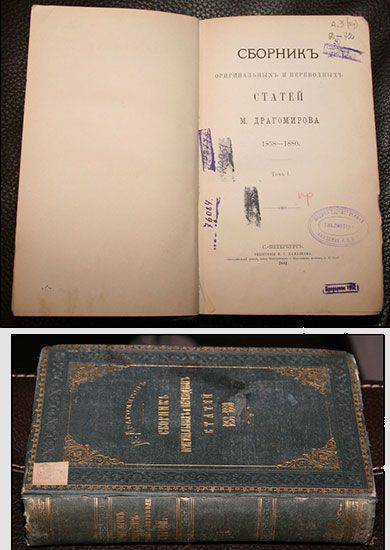
T. I. Spb., 1881.
In 1889, the year M.I. Dragomirov appointed commander of the Kiev Military District. By this time, he had developed a coherent system of training and education of the troops, which, by its novelty and originality, vitality and meeting the needs of time, not only gained the right to exist, but was adopted as the basis for the combat training of the Russian army.
Commanding the troops of the Kiev Military District, Dragomirov vigorously set about implementing his system of upbringing and education. The commander of the district set forth his views, demands and remarks in “orders of command, orders and instructions to the troops of the Kiev district”, which in the aggregate were a system of training and checking military units in all departments of their combat training.
During this period, the literary work of M.I. Dragomirova adopted not only a special military, but also a social character.
30 August 1891 Dragomirov was promoted to General of Infantry. He actively participated in the development of statutes, regulations and instructions for the Russian army. Virtually no pan-army issue was resolved without the active participation of Dragomirov, not a single statute passed without its censorship. Dragomirov was rightfully recognized as "a teacher and educator of the Russian soldier and officer."
Authority M.I. The Russian army established itself firmly in the Russian army, however, as noted by some Russian military historians, “only in the unsystematic nature of Russian life should we look for the reason that a strong practical school did not develop around Dragomirov, which could for a long time become the guardian of those fundamentals of army training in peacetime, over the development of which, so talentedly, consistently and so persistently throughout his life, Dragomirov worked. ”
In 1898, Dragomirov was appointed Kiev, Podolsky, and Volynsk Governor-General, leaving the post of Commander of the Kiev Military District.
In 1900, under the leadership of Dragomirov, a “Field Manual” was compiled. In the future, this charter will be revised according to the experience of the Russo-Japanese War of 1904 – 1905 and published in 1912.
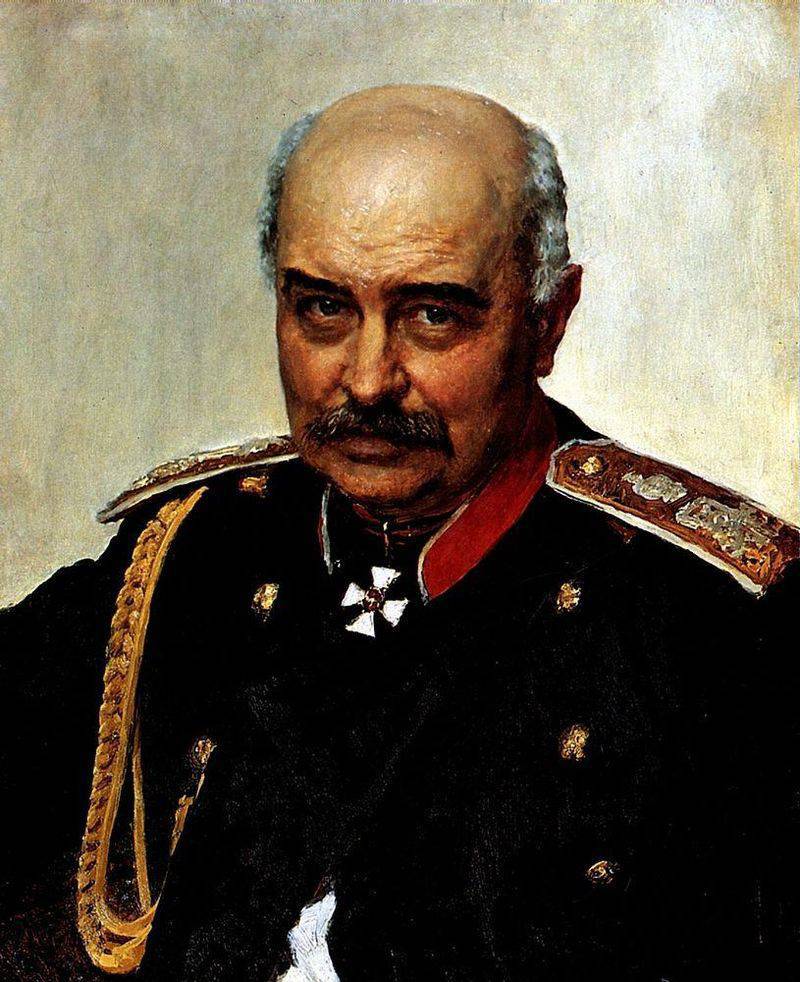
figure M, and. Dragomirov.
Artist I.E. Repin Dragomirov's activities in the position of commander of the district troops were, as it were, the crown, the synthesis of the work of his whole life. For military and state merits, Mikhail Ivanovich was awarded many Russian orders. In December 1901, he was awarded the highest award of the Russian Empire - the Order of St. Andrew the First-Called. In 1903, Dragomirov became a member of the State Council, and this ended his public service.
In the same year, Mikhail Ivanovich moved permanently to the city of Konotop, Chernigov Province. His health significantly deteriorated, but he continued active literary work.
His works were published in the military journal "Scout" under the general title "Our affairs". In these articles, Dragomirov responded to questions of public life and military affairs. From 1903, Dragomirov began to ponder and prepare the third edition of the Tactics Textbook. He managed to finish this work in a manuscript, and even dictated 9 of October 1905 of the year “Preface to the third, revised edition”.
In this preface, he noted that “the last Russian-Japanese war, in the opinion of many, brought a complete revolution in tactics. In our understanding, it was not the Russo-Japanese war that introduced a certain amendment to tactics, but the people who had arisen and matured factors — a faster-rate, long-range and accurate firearm. However, this improved factor is not capable of shaking fundamentally the fundamentals of the theory of military affairs, because in this matter, rather strong-willed than mental, - in the foreground has always stood, stands and will be a man, living force. The emergence of more sophisticated artillery and hand weapons only set off the need for more rational moral education and the formation of troops in peacetime. ”
On the night of 14 on 15, October 1905, Mikhail Ivanovich died. He was buried in Konotop.
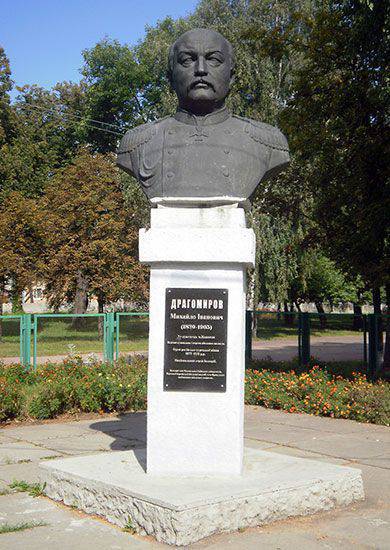
Information